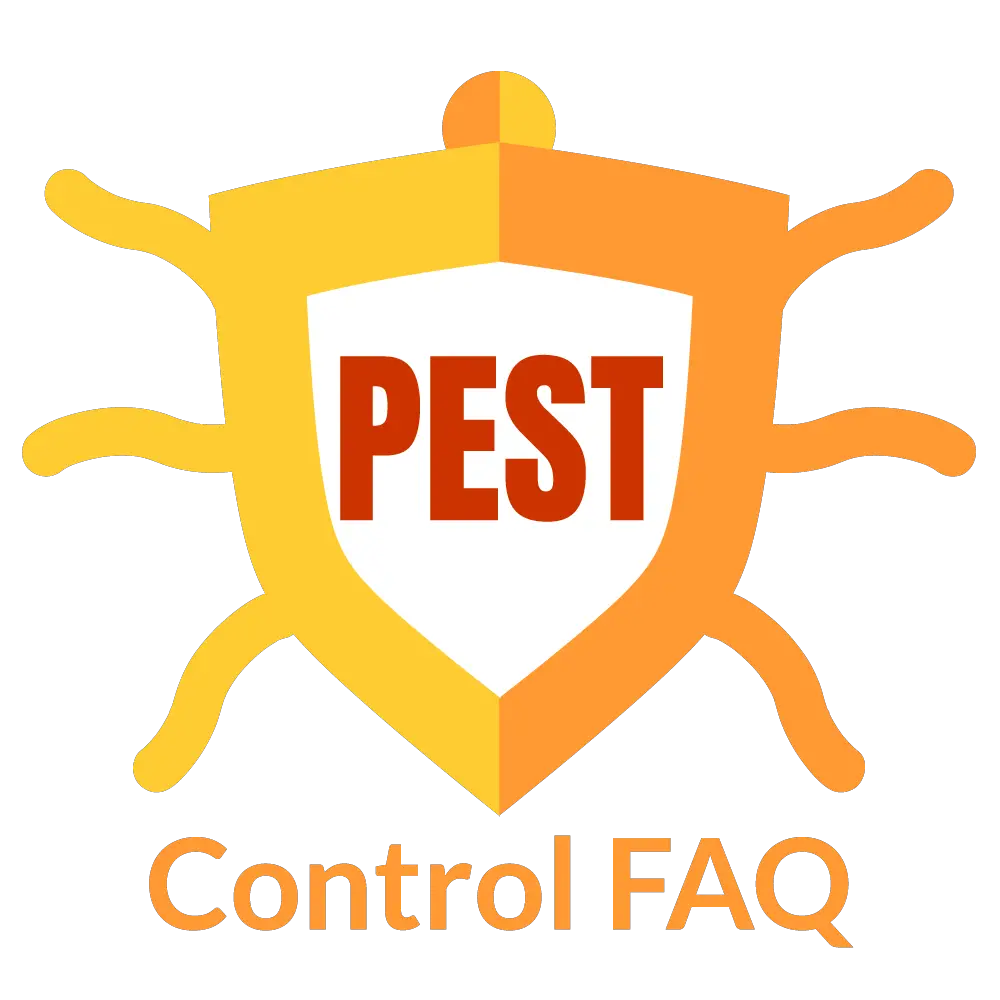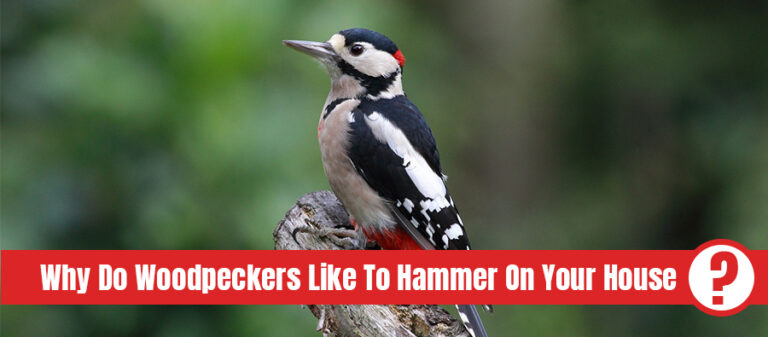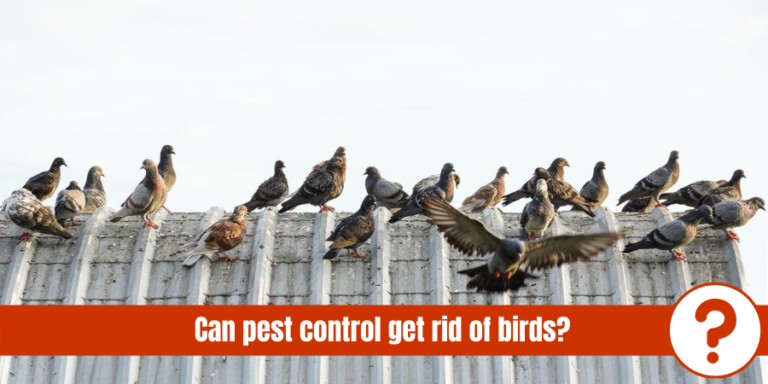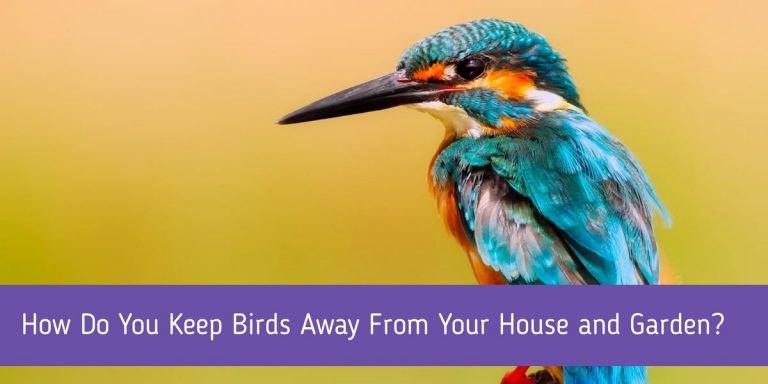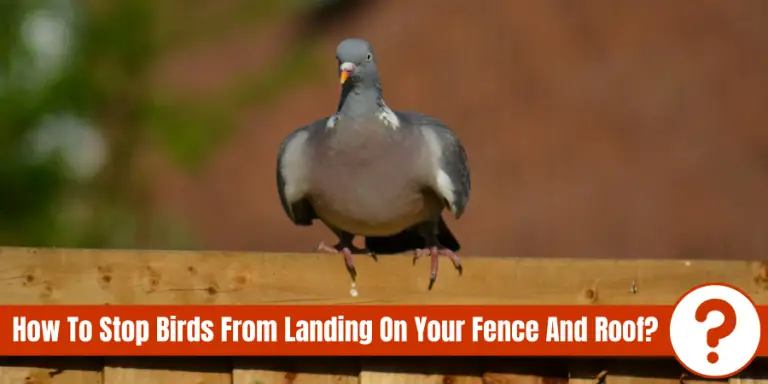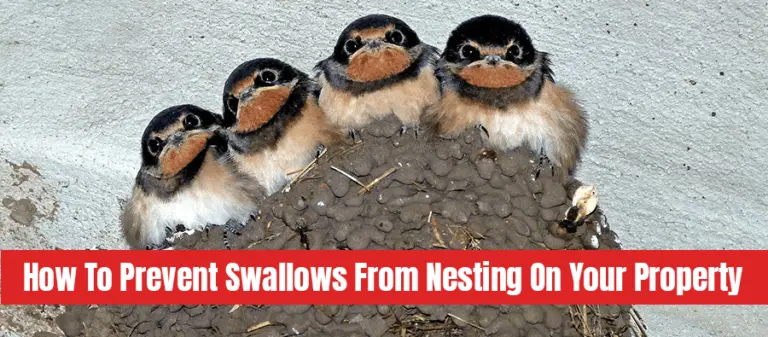
Bird Pest Control
Removing & Repelling Pest Birds
Birds the only living species to have feathers are great to have around since they tend to eat a ton of insects. So, why would you want to get rid of them?
Yes, it is nice to have, for example, hummingbirds flying around your garden. And yes, it is beneficial when birds eat up a bunch of insects and other such pests. It is when they start to hang around that they then become a pest themselves.
Pest Birds vs Beneficial Birds - When Do Birds Become Pests?
You might be wondering how having bird hang around can be such a bad thing. They eat insects, sing, and frankly they can be entertaining to watch while they feed and fly around. A beneficial bird will come in and eat all kinds pests such as:
- Beetles
- Weevils
- Caterpillars
- Grasshoppers
- Grubs
- Ants
- Snails
- Moths (including their eggs)
- Aphids
- Millipedes
- Flies
- Wasps
- and even mosquitoes
Some birds in North America are considered pests because they are not native to North America and have no natural predators. These birds include pigeons, house sparrows, and European starlings.
Birds also can become a pest because of their behavior. Pest birds build nests that can clog gutters, downspouts, and pipes. This can end up causing water damage to roofs or whole buildings. Some of the pipes that they like to nest in is the dryer exhaust which can create a potential fire hazard!
In addition, bird feces contain uric acid which causes significant damage to both vehicles and buildings. So, if you have a large number of birds hanging around your property they can significantly increase your maintenance cost.
Identifying pest birds
Maybe you already know what the pest bird on your property is. If you do not know then no problem, here are some common pest birds:
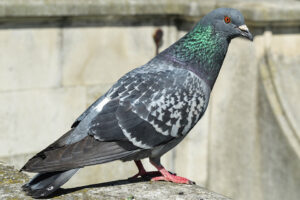
Feral Pigeon
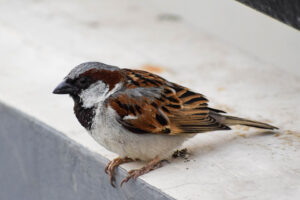
House Sparrow
House Sparrows are an invasive species in North America. They are opportunistic birds that will build their nests anywhere which often cause roof leeks and fire hazards.
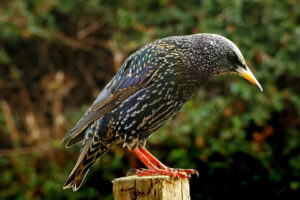
Starling
Starlings flock and roost in the thousands and often return to the same areas again and again. Due to this habit many agricultural areas have to be netted to save fruit trees from being utterly decimated.
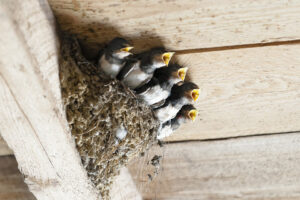
Swallow
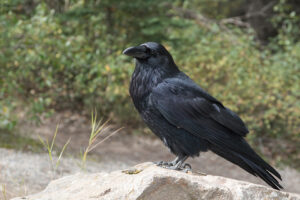
Crow
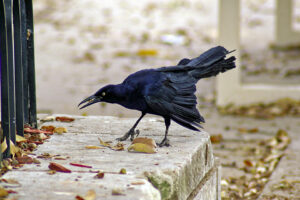
Grackle
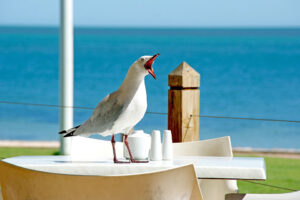
Gull
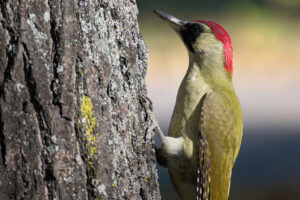
Woodpecker
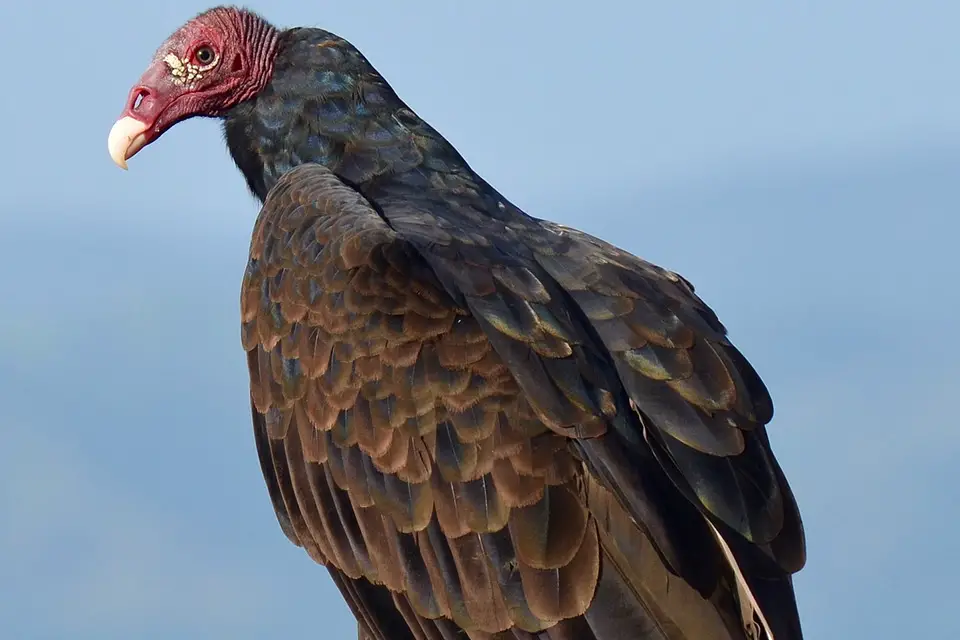
Turkey Vulture
DIY Bird Pest Control
Now that you know some of the pest birds and may have identified your pest, we need to get rid of your problem. Generally, we always try to find the least harmful way to remove any pest. As we said earlier, some of these birds are beneficial. So, they are good for the natural balance (unless we are talking about non-native, invasive species).
Of course, there are things you can do in order to get rid of birds. It’s not always necessary to call a professional service.
Keep in mind that a lot of birds are protected by the Migratory Bird Treaty Act of 1918 and other federal, state, and local laws. So, before you destroy or move a nest you should check what is allowed in your area. A lot of these laws prevent you from disturbing nests but there is generally nothing that stops you from preventing nests from being placed there in the first place.
The truth is most bird pest control techniques are of a preventive nature and they are a hit or miss. Not all of the recommended methods will work for you. Bird pest control requires frequent changes as they will learn.
Have a look at the articles below and our bird prevention tips for more details.
Professional Pest Control for Birds
Hiring a pest control company is often the best move. They are experts in their field. Do you really want to spend weeks playing around with diverse methods to control your pest birds? Chances are high that other people in your area have the same issue. So, a local pest control service will have effective ways to remove and prevent pest birds.
Skip the Hassle & Hire a Professional Pest Control Service!
Check out our exterminator search tool where you will receive free quotes from thoroughly vetted exterminators in your local area!
How to Prevent a Bird Pest or How to Keep Them Away
So, the 1 Million dollar question is: How do you keep birds away from your property? You can basically do a few things to prevent bird from becoming pests (read this article to get the full scoop):
1. Remove their food source
Granted you can’t remove all their food sources especially if you’re gardening but there are a few steps you can take:
- If you have a bird feeder you can take it down during times that there are a lot of migratory pest birds flying through.
- You should also ensure that your trash cans have their lids securely in place.
- If you find yourself enjoying a meal or two outside, be sure to clean up all crumbs and other food particles. Last thing you need is for pest birds to associate your home with food.
2. Remove their water source
All creatures need water and that obviously includes birds. Now, if you have a pool or water feature in your yard then you wont be able to remove the water source. But you can ensure that there are no other water sources around your house such as an open trash can, pots or planters, and any other area water might gather after a rainstorm.
3. Prevent nesting spots
In order to prevent the bird nesting in the first place, you can trim back trees, clean up your yard of debris and use physical barriers. This is an important method that results in success.
4. Install decoys, bright objects, and obstacles
Having predator decoys, nets, lines, and bright objects will work for most birds. You just have to find the right product for your pest bird.
These products are a hit or miss depending on the bird species AND if you move the decoys regularly. You see, birds aren’t as dumb as you may think. They will notice that something stays in one spot for months. Once they notice, it’s a fake, you’ll get those nests back.
See below for our recommended products!
5. Apply bird repellent gels or homemade sprays
Another method that is effective in some case is using gels and sprays. Bird repellent gels are applied to surfaces where larger birds like to hang out. These are irritated by the feeling of the gel on their feet. Eventually, they won’t return.
You can use homemade sprays with certain ingredients that birds don’t like, such as garlic, chili pepper, peppermint oil, and red vinegar. Spray it in the areas where pest birds like to hang out.
Most Effective Products to Prevent Bird Pests
Predator Decoys
Decoys can work well if you pick the right one for your pest bird and if you move them regularly.
Obstacles & Spikes
Bird spikes are one of the most effective products for controlling birds and keeping them from nesting.
Bird Repellent Gel
How can you effectively use bird repellent gels? Do they work for all birds? Are there ways to increase the odds?
You see, there are some useful and effective ways to get rid of birds and to keep them away for longer. You just have to keep up your game!
